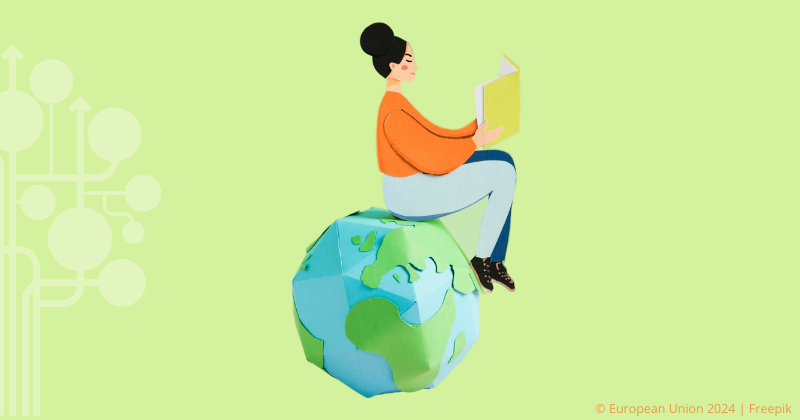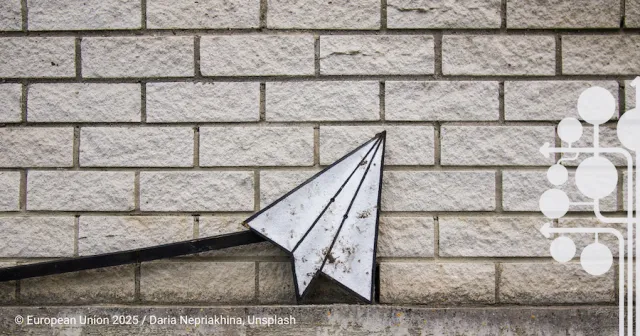Preparing adults for twin transitions through competence development

Twin transitions
Transitions are shifts from one state to another characterised by different fundamental features. For ecological and social systems, transitioning to a new state means reorganising and transforming themselves, thus creating novel systemic structures and architectures. Concepts like energy, social, governance, urban, and economic transitions have penetrated policy vocabularies and become the epicentre of interest for scientists and researchers worldwide.
The term “twin transition” refers to simultaneous transitions to a greener and more digitalised state (Rehman et al., 2023). As such, twin transitions involve sustainability with digital transitions. In twin transitions, digital tools allow and expedite the achievement of sustainability-related goals and the pursuit of a zero carbon and climate-neutral future. In parallel, sustainable thinking governs the digitalisation process, safeguarding the fair distribution of benefits derived from exploiting digital tools among population segments and using digital artefacts to guarantee societal wellbeing.The twinning of the two transition processes can multiply the benefits expected from each one, such as reducing pollution, mitigating climate change, increasing food security, and ensuring that digitalisation improves people’s lives.
The European Union is leading the way towards twin transitions through a series of actions and initiatives targeted especially to hard-to-abate sectors, like agriculture, food manufacturing, transportation, construction industry, and energy production. In parallel, the Union gives prominence to equipping adults with essential skills and competencies to endorse, effectively navigate, and promote twin transitions. In its report Towards a Green and Digital Future, the European Commission’s Joint Research Centre (Muench et al., 2022) emphasises the need to offer upskilling opportunities to the labor force and all citizens to support and expedite twin transitions, as well as to help them adapt to the technological and socio-economic conditions that these transitions shape. Moreover, the European Skills Agenda for Sustainable Competitiveness, Social Fairness, and Resilience (European Commission, 2020) sets as a fundamental priority to build and sharpen the skills needed by adults to initiate and successfully undergo twin transitions.
Twin transition competencies
Transitions are competence-intensive processes. They expose individuals to new ways of working, living, and existing in the world. They require people to change habits, mindsets, and lifestyles, abandon old routines, adopt new work cultures, anticipate how their actions will impact the future, and grasp their own existence within a more digitalised and sustainable society. The history of transitions has taught us that a person’s well-being when social and technological systems go through transitional pathways depends on her/his adaptive capacity, which in turn relies on their skills and competencies.
As unique and dynamic phenomena, twin transitions require a mosaic of competencies to keep up with change and thrive in personal and professional life. This mosaic includes sustainability-related and digital competencies. The first category involves competencies allowing adults to understand the meaning of sustainability, valuing its importance, working and acting pro-sustainably. The second concerns a set of knowledge, skills, and attitudes enabling individuals to safely deal with existing and emerging digital technologies, exploit their potential, and protect themselves and society from possible hazards associated with their use.
The European Union has developed two frameworks to summarise these two clusters of competencies.
The GreenComp (Bianchi et al., 2022) identifies and segments key sustainability competencies that can transform people of every age and educational background into critical, systemic thinkers who are concerned about the current and future sustainability of our natural and social environment. GreenComp comprises four areas of interrelated competencies, each one consisting of three competencies. These areas include embodying sustainability values, embracing sustainability complexity, envisioning future sustainability scenarios, and acting individually and collectively to create sustainable futures.
The DigComp (Vuorikari et al., 2022) describes five sets of competencies that permit persons to confidently, critically, and responsibly engage with digital tools and to use these artefacts for working, learning, and participating in society. The areas identified in DigComp refer to basic information and data literacy, the capacity to communicate and collaborate in the digital world, the ability to generate digital content, the competence of users to ensure the safety of their devices and content while also understanding and tackling potential negative impacts of digital technologies on their health and the environment, and their capability to solve problems in digital spaces. How to equip adults with twin transition competencies Supplying adults with the competencies included in GreenComp and DigComp is far from easy.
The two frameworks are valuable premises upon which efforts to upskill and reskill adults can be based. However, adapting them into specific socio-cultural and work-related contexts remains challenging for actors designing and providing adult education opportunities. To this end, designing and validating innovative twin transitions-related competence-building models is necessary. By combining experiential and social learning approaches, these models can facilitate learner-centred competence development processes in authentic settings, thus opening up spaces for enhancing sustainability-related and digital skills while twin transitions unfold.

The above illustrations are available at 3D Bay (https://3dbay.io/) under CC Licenses.
Moreover, given that distinct groups of learners initiate their competence development journeys from different points of departure, possess varying levels of expertise, and have diverse points of view, multi-actor approaches can easily amalgamate levels of previous knowledge with the competencies pursued through the use of GreenComp and DigComp. Alliances involving enterprises, training and vocational education providers, non-governmental organisations, twin transition intermediaries, universities, and citizen organisations can serve as a site for capitalising on the dynamics of social interactions among heterogeneous actors and hybridising competencies from a range of domains.
References
Bianchi, G., Pisiotis, U., and Cabrera, M. (2022). GreenComp: The European Sustainability Competence Framework. Publications Office of the European Union, Luxembourg. Available at: https://publications.jrc.ec.europa.eu/repository/bitstream/JRC128040/JRC128040_001.pdf
European Commission. (2020). European skills agenda for sustainable competitiveness, social fairness and resilience. Available at: https://migrant-integration.ec.europa.eu/sites/default/files/2020-07/SkillsAgenda.pdf
Muench, S., Stoermer, E., Jensen, K., Asikainen, T., Salvi, M. and Scapolo, F. (2022). Towards a Green and Digital Future, Publications Office of the European Union, Luxembourg, doi:10.2760/977331, JRC129319.
Rehman, S. U., Giordino, D., Zhang, Q., & Alam, G. M. (2023). Twin transitions & industry 4.0: Unpacking the relationship between digital and green factors to determine green competitive advantage. Technology in Society, 73, 102227. https://doi.org/10.1016/j.techsoc.2023.102227
Vuorikari, R., Kluzer, S., and Punie, Y. (2022). DigComp 2.2: The Digital Competence Framework for Citizens. Publications Office of the European Union, Luxembourg. Available at: https://publications.jrc.ec.europa.eu/repository/bitstream/JRC128415/JRC128415_01.pdf
About Chrysanthi Charatsari
Chrysanthi holds a Ph.D. in Agricultural Education and Extension from the Aristotle University of Thessaloniki. She has completed four postdoctoral fellowships in Agricultural Extension, Rural Sociology, and Adult Education. She participates as a scientific responsible or research associate in many projects funded by the European Union and/or national funds. She has developed an adapted version of Farmer Field Schools for Greek farmers, among other research activities.
Today, she is a visiting lecturer at the Hellenic Open University and a postdoctoral researcher at the Aristotle University of Thessaloniki. She has published more than 90 papers in peer-reviewed journals, collective volumes, and proceedings of international and national conferences. Her research interests include agricultural extension/education, agricultural innovation, digitalisation, sustainability transitions, and innovative learning techniques.
Kommentar
An excellent reflection
In fact, transitions are skill-intensive processes. They confront individuals with new ways of working and experiencing the world. And digital skills, such as Artificial Intelligence today, force us to change habits and mentalities. We have to abandon old routines and adopt new ways of working.
- Logga in eller registrera dig för att kunna kommentera
A great article i reckon the…
A great article i reckon the concept of twin transitions, where digital tools facilitate the achievement of sustainability goals and vice versa, is particularly relevant in today's context of rapid technological and environmental changes.
I appreciate the focus on competence development as a key enabler for these transitions. The frameworks of GreenComp and DigComp outlined in the article offer comprehensive roadmaps for equipping individuals with the necessary skills. The emphasis on experiential and social learning approaches to enhance these competencies is also well-founded, as real-world application and collaborative learning can significantly boost the effectiveness of educational initiatives.
Moreover, the article highlights the European Union's proactive role in promoting these transitions through targeted actions and initiatives, particularly in hard-to-abate sectors. This leadership is essential for setting a global standard and encouraging other regions to follow suit.
However, implementing these frameworks and ensuring widespread competence development will undoubtedly be challenging. It will require sustained effort and collaboration among various stakeholders, including governments, educational institutions, businesses, and civil society. Tailoring these efforts to the specific socio-cultural and work-related contexts of different groups is crucial for success.
- Logga in eller registrera dig för att kunna kommentera
Thanks Rob! Indeed, a…
Thanks Rob!
Indeed, a critical challenge is finding suitable governance schemes for facilitating context-specific knowledge exchange and competence co-development during twin transitions.
- Logga in eller registrera dig för att kunna kommentera
This article by Chrysanthi…
This article by Chrysanthi Charatsari offers a comprehensive and insightful exploration of the concept of twin transitions and the role of competence development in preparing adults for these transitions. It provides a clear understanding of the challenges and opportunities associated with transitioning to a greener and more digitalized society, as well as practical frameworks for developing the necessary competencies. Charatsari's expertise and research contributions in agricultural education and sustainability transitions further enrich the article, making it a valuable resource for educators, policymakers, and practitioners alike.
- Logga in eller registrera dig för att kunna kommentera





From environmental awareness…